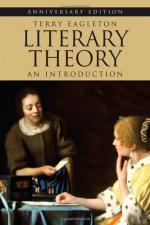
|
| Name: _________________________ | Period: ___________________ |
This quiz consists of 5 multiple choice and 5 short answer questions through Chapter 4, Post-Structuralism.
Multiple Choice Questions
1. According to Eagleton, the subject in phenomenology was the source of all what?
(a) Meaning.
(b) Oppression.
(c) Life.
(d) Violence.
2. According to Eagleton, why did intellectuals preoccupy themselves with language in the late-nineteenth and twentieth centuries?
(a) Because discourse had become an instrument of opposition in academia.
(b) Because discourse had become irrelevant in industrial society.
(c) Because discourse had become elevated by intellectuals.
(d) Because discourse had become degraded to an instrument of industrial capitalism.
3. How did post-structuralism respond to France's student movement's failed attempt to break state power?
(a) Post-structuralism sought to break state power.
(b) Post-structuralism sought to break the structures of language.
(c) Post-structuralism sought to create a more powerful language.
(d) Post-structuralism sought to create a free language.
4. According to Eagleton, why is it an illusion to think that he can be present to us in what he says and writes?
(a) Because he is no longer present in the world but in some other present in the future.
(b) Because the language he uses is not a tool but something he is made of and therefore always divided.
(c) Because he is a concrete entity but language is not.
(d) Because language is only a tool, not something he is made of.
5. According to Eagleton, there are forms of post-structuralism that represent what kind of withdrawal from history?
(a) Calm.
(b) Intellectual.
(c) Hedonist.
(d) Pragmatic.
Short Answer Questions
1. What is the name of the Yale theorist who believed that all language is metaphorical?
2. Eagleton argues that for Stanley Fish, what a text "does" to us is a matter of what we do to what?
3. Who silenced the Russian formalists, according to Eagleton?
4. What example from the late sixteenth and early seventeenth centuries does Eagleton provide that was not considered purely factual?
5. Why is the example Eagleton gives of the sign in the London Underground system that "dogs must be carried on the escalator" a case of estrangement?
|
This section contains 377 words (approx. 2 pages at 300 words per page) |

|




